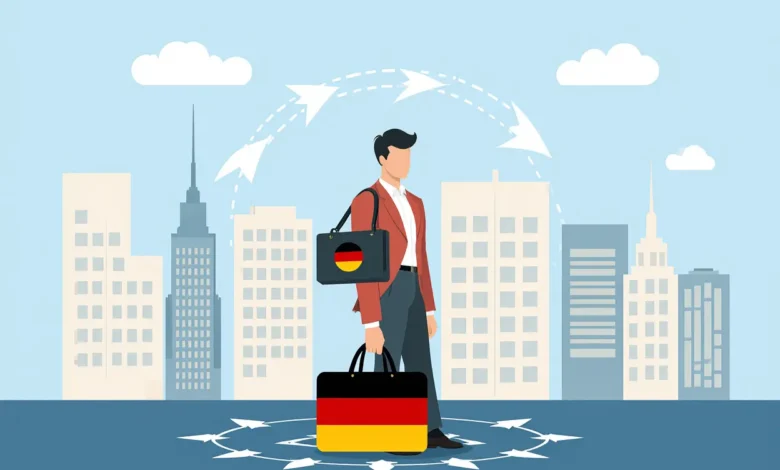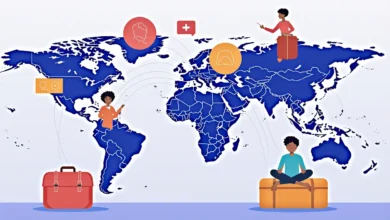Germany’s Economic Immigration Programs: Your Ultimate Guide to Thriving in Europe’s Economic Powerhouse

Germany has emerged as Europe’s most attractive destination for skilled professionals seeking economic opportunities abroad. Germany’s Economic Immigration Programs have undergone significant transformations in 2025, making it easier than ever for qualified international talent to build successful careers in this economic powerhouse.
Whether you’re a recent graduate, experienced professional, or entrepreneur, understanding Germany’s Economic Immigration Programs can open doors to unprecedented career growth, excellent work-life balance, and access to the European Union market. This comprehensive guide walks you through every pathway, requirement, and strategy to successfully immigrate to Germany for work.
Table of Contents
Why Choose Germany’s Economic Immigration Programs?
Germany faces a significant skilled worker shortage, with over 22,422 additional visas issued to migrant workers in 2024 alone, with a 10% increase planned for 2025. This labor shortage creates exceptional opportunities for international professionals.
Key advantages of Germany’s Economic Immigration Programs include:
- Strong Economy: Europe’s largest economy with stable job market
- High Salaries: Competitive wages with excellent benefits
- Work-Life Balance: 35-40 hour work weeks with generous vacation time
- Path to Permanent Residence: Clear route to long-term settlement
- EU Access: Freedom to travel and work across European Union
- Quality Healthcare: Universal healthcare system
- Educational Opportunities: World-class universities and training programs
Overview of Germany’s Economic Immigration Programs
Germany’s Economic Immigration Programs consist of several distinct pathways designed to attract different types of skilled workers:
1. EU Blue Card Germany
The premium pathway for highly skilled professionals with university degrees.
2. Skilled Worker Visa
For professionals with vocational training or specific expertise.
3. Opportunity Card (Chancenkarte)
Point-based system for job seekers to enter Germany and find employment.
4. Work Visa for Qualified Professionals
Traditional employment-based residence permit.
5. Self-Employment Visa
For entrepreneurs and freelancers.
Let’s explore each pathway within Germany’s Economic Immigration Programs in detail.
EU Blue Card: The Premium Path in Germany’s Economic Immigration Programs
The EU Blue Card represents the most prestigious route within Germany’s Economic Immigration Programs. Your job in Germany must enable you to earn a gross annual salary of at least €48,300 (as of 2025), making it highly attractive for skilled professionals.
EU Blue Card Salary Requirements 2025
The salary thresholds for Germany’s Economic Immigration Programs via EU Blue Card are:
- Standard occupations: €48,300 gross annually
- Shortage occupations: €43,759.80 gross annually for bottleneck professions like IT and healthcare
EU Blue Card Eligibility Requirements
To qualify for this tier of Germany’s Economic Immigration Programs, you need:
Educational Qualifications:
- University degree (minimum 3 years)
- Recognized foreign qualification
- Proof of degree recognition through Anabin database
Employment Requirements:
- Job offer from German employer
- Employment contract meeting salary thresholds
- Federal Employment Agency approval if earning less than €4,025 monthly
Language Requirements: No German language skills required for main applicant, making this pathway within Germany’s Economic Immigration Programs particularly accessible.
EU Blue Card Benefits
The EU Blue Card offers exceptional advantages within Germany’s Economic Immigration Programs:
- Fast-track permanent residence: Eligibility after 33 months (21 months with German B1)
- Family reunification: Spouse can work immediately
- EU mobility: Transfer to other EU countries after 12 months
- Job flexibility: Change employers after initial period
Skilled Worker Visa: Vocational Path in Germany’s Economic Immigration Programs
Germany’s Economic Immigration Programs recognize that not all skilled workers have university degrees. The Skilled Worker Visa caters to professionals with vocational training.
Skilled Worker Visa Requirements
Qualification Recognition:
- Recognized vocational training (minimum 2 years)
- State-recognized qualification equivalent to German standards
- Professional experience in chosen field
Employment Conditions:
- Minimum annual gross salary of €43,470 (2025)
- €53,130 annual salary if over 45 years old
- Federal Employment Agency (BA) approval required
Language Requirements:
- German A2 level (basic conversational)
- Higher levels preferred for certain professions
In-Demand Skilled Professions
Germany’s Economic Immigration Programs prioritize these sectors:
Healthcare and Social Work:
- Nurses and care assistants
- Medical technicians
- Physical therapists
Technical and IT:
- Software developers
- Engineering technicians
- Data analysts
Skilled Trades:
- Electricians and mechanics
- Construction specialists
- Manufacturing technicians
Opportunity Card: Innovation in Germany’s Economic Immigration Programs
The Opportunity Card (Chancenkarte) represents the newest addition to Germany’s Economic Immigration Programs, launched to attract job seekers through a point-based system.
Opportunity Card Point System
Germany’s Economic Immigration Programs award points based on:
Educational Qualifications (1-3 points):
- University degree: 3 points
- Vocational training: 2 points
- Recognized foreign qualification: 1 point
Language Skills (1-2 points):
- German B2 or higher: 2 points
- German A2-B1: 1 point
- English C1: 1 point
Professional Experience (1-2 points):
- 5+ years experience: 2 points
- 2-4 years experience: 1 point
Age Factor (1 point):
- Under 35 years: 1 point
Connection to Germany (1 point):
- Previous stay or study in Germany
Opportunity Card Requirements
To qualify for this pathway in Germany’s Economic Immigration Programs:
- Minimum 6 points from categories above
- Financial proof: Sufficient bank balances or regular income to secure livelihood
- Health insurance coverage
- Clean criminal record
Opportunity Card Benefits
This innovative component of Germany’s Economic Immigration Programs offers:
- Job search period: Up to 12 months to find employment
- Trial work: 20 hours weekly or 90 days annually
- Family inclusion: Spouse and children can accompany
- Conversion path: Switch to work visa upon finding qualified employment
Work Visa for Qualified Professionals in Germany’s Economic Immigration Programs
The traditional work visa remains a cornerstone of Germany’s Economic Immigration Programs for professionals with confirmed employment.
Qualified Professional Visa Requirements
Employment Conditions:
- Concrete job offer from German employer
- Salary and working conditions equivalent to German employees
- Maximum 4-year initial residence permit
Qualification Standards:
- University degree or recognized vocational training
- Relevant professional experience
- Qualification recognition where required
Qualified Professional Visa Process
The application process within Germany’s Economic Immigration Programs involves:
- Job Search: Secure employment with German employer
- Document Preparation: Gather qualifications and certificates
- Visa Application: Submit through German consulate
- BA Assessment: Federal Employment Agency review
- Visa Approval: Typically 4-12 weeks processing
Self-Employment Visa: Entrepreneurial Path in Germany’s Economic Immigration Programs
Germany’s Economic Immigration Programs welcome entrepreneurs and freelancers through specialized self-employment visas.
Self-Employment Visa Categories
Freelancer Visa:
- For professionals like consultants, designers, writers
- Proof of professional qualifications
- Client contracts or business plan
Entrepreneur Visa:
- For business founders
- Minimum €25,000 investment typically required
- Detailed business plan
- Economic benefit to Germany
Self-Employment Requirements
Financial Criteria:
- Adequate capital investment
- Projected income sustainability
- Health insurance coverage
Business Viability:
- Market research and business plan
- Professional qualifications
- Economic impact assessment
Digital Revolution in Germany’s Economic Immigration Programs
Germany introduced the Consular Services Portal on January 1st, 2025, allowing online applications for 28 types of national visas. This digitization represents a major advancement in Germany’s Economic Immigration Programs.
Online Application Benefits
Streamlined Process:
- 24/7 application submission
- Document upload capabilities
- Real-time status tracking
- Reduced processing times
Accessible Globally:
- Available from any country worldwide
- Multiple language support
- Mobile-friendly interface
Step-by-Step Application Guide for Germany’s Economic Immigration Programs
Phase 1: Preparation and Research
Assess Your Profile:
- Evaluate qualifications against German standards
- Determine best pathway within Germany’s Economic Immigration Programs
- Calculate point scores for applicable programs
Document Gathering:
- Educational certificates and transcripts
- Professional certifications
- Language test results
- CV and employment references
- Financial statements
Phase 2: Qualification Recognition
Academic Credentials:
- Check Anabin database for recognition status
- Obtain Statement of Comparability if needed
- Translate documents officially
Vocational Qualifications:
- Apply through relevant recognition bodies
- Complete any required examinations
- Secure professional licensing where applicable
Phase 3: Job Search Strategy
Networking Approaches:
- LinkedIn and XING professional networks
- Industry-specific job boards
- German recruitment agencies
- Professional associations
Application Materials:
- German-style CV (Lebenslauf)
- Targeted cover letters
- Portfolio or work samples
- Professional references
Phase 4: Visa Application Process
Documentation Checklist:
- Passport with sufficient validity
- Completed visa application form
- Biometric photographs
- Educational and professional certificates
- Employment contract or job offer
- Financial proof and insurance
- Criminal background check
Submission Process:
- Online portal or consulate appointment
- Biometric data collection
- Interview if required
- Processing fee payment
Financial Requirements Across Germany’s Economic Immigration Programs
Understanding the financial landscape is crucial for success in Germany’s Economic Immigration Programs.
Salary Benchmarks by Program
| Program Type | Minimum Salary (2025) | Special Conditions |
|---|---|---|
| EU Blue Card | €48,300 standard | €43,759.80 for shortage occupations |
| Skilled Worker | €43,470 standard | €53,130 if over 45 years |
| Work Visa | Market rate | Equivalent to German employees |
| Self-Employment | Variable | Sustainable income projection |
Cost of Living Considerations
Major Cities (Monthly Expenses):
- Munich/Frankfurt: €2,500-3,500
- Berlin/Hamburg: €2,000-3,000
- Cologne/Stuttgart: €2,200-3,200
- Smaller Cities: €1,800-2,500
Breakdown of Monthly Costs:
- Rent: €800-1,500
- Food and groceries: €300-500
- Transportation: €80-150
- Health insurance: €200-400
- Utilities and internet: €150-250
- Entertainment and miscellaneous: €200-400
Timeline and Processing Information
Expected Processing Times
Germany’s Economic Immigration Programs processing varies by pathway:
- EU Blue Card: 4-8 weeks
- Skilled Worker Visa: 6-12 weeks
- Opportunity Card: 8-16 weeks
- Self-Employment Visa: 8-20 weeks
Factors Affecting Processing Speed
Accelerating Factors:
- Complete documentation
- Recognized qualifications
- Shortage occupation employment
- Online application submission
Potential Delays:
- Missing documents
- Qualification recognition required
- High application volumes
- Additional security checks
Integration and Settlement Support
Germany’s Economic Immigration Programs include comprehensive integration support.
Language Learning Resources
Government Programs:
- Integration courses (Integrationskurs)
- Professional German courses
- Online learning platforms
- Workplace language training
Private Options:
- University language centers
- Private language schools
- Conversation exchanges
- Mobile learning apps
Professional Development
Continuing Education:
- Professional certification programs
- University continuing education
- Industry-specific training
- Leadership development courses
Networking and Community:
- Professional associations
- Expat communities
- Chamber of Commerce events
- Industry meetups and conferences
Success Stories: Real Examples from Germany’s Economic Immigration Programs
Case Study 1: Software Developer from India
Background: Raj, a 28-year-old software developer with 5 years experience
Pathway: EU Blue Card via IT shortage occupation Salary: €45,000 (meeting shortage occupation threshold) Timeline: 6 weeks processing Outcome: Successful integration, promoted within 18 months
Key Success Factors:
- Strong technical skills in demand
- English proficiency sufficient initially
- Active networking in tech community
- Continuous German language learning
Case Study 2: Nurse from Philippines
Background: Maria, a 32-year-old registered nurse with hospital experience
Pathway: Skilled Worker Visa in healthcare Salary: €44,000 annual Timeline: 10 weeks including qualification recognition Outcome: Permanent employment, family reunification after 1 year
Key Success Factors:
- Healthcare shortage occupation
- Completed German A2 before application
- Qualification recognition completed early
- Employer support throughout process
Case Study 3: Mechanical Engineer from Egypt
Background: Ahmed, a 35-year-old engineer with master’s degree
Pathway: Opportunity Card, then converted to EU Blue Card Process: 8 months job search, secured €50,000 salary position Outcome: EU Blue Card approval, family joining within 6 months
Key Success Factors:
- High point score (8 points total)
- Systematic job search approach
- Professional networking
- Flexibility in location preferences
Common Challenges and Solutions in Germany’s Economic Immigration Programs
Challenge 1: Qualification Recognition
Problem: Foreign degrees not immediately recognized
Solutions:
- Start recognition process early
- Use Statement of Comparability option
- Consider additional certification courses
- Seek employer who values international experience
Challenge 2: Language Barriers
Problem: German language requirements seem overwhelming
Solutions:
- Start learning before applying
- Use EU Blue Card pathway (no German required initially)
- Focus on professional German vocabulary
- Practice with native speakers online
Challenge 3: Job Market Navigation
Problem: Understanding German hiring practices
Solutions:
- Adapt CV to German standards
- Learn about German workplace culture
- Network actively through professional platforms
- Consider recruitment agency assistance
Challenge 4: Bureaucratic Processes
Problem: Complex administrative requirements
Solutions:
- Use professional immigration consultants
- Leverage digital application platforms
- Maintain organized document files
- Follow up proactively on applications
Future Outlook: Evolution of Germany’s Economic Immigration Programs
Upcoming Changes and Trends
Digital Integration:
- Expanded online services
- AI-assisted application processing
- Real-time status updates
- Mobile-first approach
Policy Developments:
- Potential point system expansion
- Regional visa programs
- Industry-specific pathways
- Enhanced family reunification options
Skills Focus Areas:
- Green energy and sustainability
- Digital transformation
- Healthcare and elderly care
- Advanced manufacturing
Long-term Settlement Prospects
Path to Permanent Residence:
- EU Blue Card holders: 21-33 months
- Other visa holders: 5 years typically
- Integration requirements met
- German language proficiency
Citizenship Opportunities:
- 8 years residence (5 years for EU Blue Card)
- German language B1 level
- Integration test completion
- Financial self-sufficiency
Frequently Asked Questions About Germany’s Economic Immigration Programs
Q1: Can I apply for Germany’s Economic Immigration Programs without a job offer?
A: Yes, the Opportunity Card allows you to enter Germany to search for employment for up to 12 months. You need to score at least 6 points in the point system and demonstrate financial means to support yourself during the job search period.
Q2: How long does it take to get permanent residence through Germany’s Economic Immigration Programs?
A: EU Blue Card holders can apply for permanent residence after 21 months (with German B1 language skills) or 33 months (with basic German). Other visa holders typically need 5 years of continuous residence, though this can be reduced to 3 years in exceptional cases.
Q3: Can my family accompany me through Germany’s Economic Immigration Programs?
A: Yes, all major pathways allow family reunification. EU Blue Card holders enjoy the fastest family reunification process, with spouses receiving immediate work authorization. Children under 18 can attend German schools free of charge.
Q4: Do I need to speak German to apply for Germany’s Economic Immigration Programs?
A: It depends on the pathway. EU Blue Card applicants don’t need German language skills initially. Skilled Worker Visa applicants typically need A2 level German. The Opportunity Card awards points for German skills but doesn’t require them as a minimum.
Q5: What happens if I lose my job while on Germany’s Economic Immigration Programs?
A: You typically have 3-6 months to find new employment, depending on your visa type and how long you’ve been in Germany. EU Blue Card holders have more flexibility and can remain unemployed for longer periods. It’s important to notify authorities and actively search for new employment.
Conclusion: Your Journey Through Germany’s Economic Immigration Programs
Germany’s Economic Immigration Programs represent one of the world’s most comprehensive and accessible pathways for skilled professionals seeking international career opportunities. With the launch of digital application platforms in 2025 and continued focus on attracting global talent, there has never been a better time to consider Germany as your next career destination.
Key takeaways for success in Germany’s Economic Immigration Programs:
- Choose the right pathway based on your qualifications and career goals
- Start the process early – qualification recognition and applications take time
- Invest in language skills even if not immediately required
- Network actively within German professional communities
- Maintain flexibility in location and role preferences
- Plan financially for both application costs and initial settlement
The transformation of Germany’s Economic Immigration Programs in 2025 reflects the country’s commitment to attracting and retaining international talent. Whether you’re drawn by the EU Blue Card’s premium benefits, the Opportunity Card’s flexibility, or traditional work visa pathways, Germany offers a clear route to professional success and long-term settlement in Europe’s economic powerhouse.
Take the first step today by assessing your qualifications, researching your chosen pathway within Germany’s Economic Immigration Programs, and beginning your German language journey. Your successful career in Germany awaits.
Ready to start your German immigration journey? Share this comprehensive guide with fellow professionals and explore our related articles on European immigration opportunities and career development strategies. Your dream of working in Germany is closer than you think through these expanded Economic Immigration Programs.
This article is updated regularly to reflect the latest changes in Germany’s Economic Immigration Programs. Bookmark this page and check back for the most current information and requirements.


